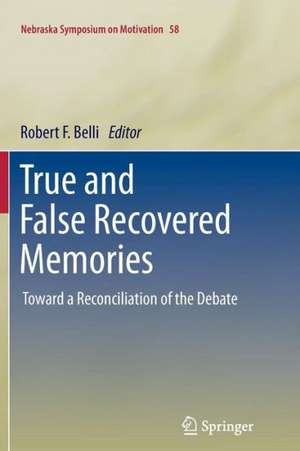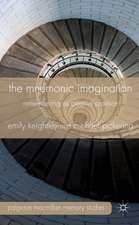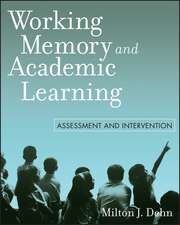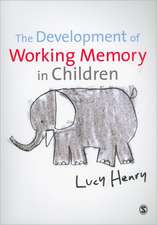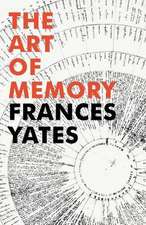True and False Recovered Memories: Toward a Reconciliation of the Debate: Nebraska Symposium on Motivation, cartea 58
Editat de Robert F. Bellien Limba Engleză Paperback – 25 ian 2014
| Toate formatele și edițiile | Preț | Express |
|---|---|---|
| Paperback (1) | 639.73 lei 6-8 săpt. | |
| Springer – 25 ian 2014 | 639.73 lei 6-8 săpt. | |
| Hardback (1) | 645.96 lei 6-8 săpt. | |
| Springer – 17 noi 2011 | 645.96 lei 6-8 săpt. |
Din seria Nebraska Symposium on Motivation
-
 Preț: 219.43 lei
Preț: 219.43 lei -
 Preț: 356.35 lei
Preț: 356.35 lei -
 Preț: 367.50 lei
Preț: 367.50 lei -
 Preț: 185.28 lei
Preț: 185.28 lei -
 Preț: 364.62 lei
Preț: 364.62 lei -
 Preț: 361.14 lei
Preț: 361.14 lei - 15%
 Preț: 637.28 lei
Preț: 637.28 lei -
 Preț: 398.42 lei
Preț: 398.42 lei -
 Preț: 362.11 lei
Preț: 362.11 lei - 15%
 Preț: 643.00 lei
Preț: 643.00 lei - 15%
 Preț: 639.73 lei
Preț: 639.73 lei - 15%
 Preț: 642.51 lei
Preț: 642.51 lei - 15%
 Preț: 640.88 lei
Preț: 640.88 lei - 15%
 Preț: 637.13 lei
Preț: 637.13 lei - 20%
 Preț: 551.31 lei
Preț: 551.31 lei - 15%
 Preț: 641.85 lei
Preț: 641.85 lei - 15%
 Preț: 639.73 lei
Preț: 639.73 lei - 15%
 Preț: 643.65 lei
Preț: 643.65 lei - 18%
 Preț: 1003.70 lei
Preț: 1003.70 lei - 18%
 Preț: 786.98 lei
Preț: 786.98 lei - 18%
 Preț: 893.40 lei
Preț: 893.40 lei - 24%
 Preț: 732.54 lei
Preț: 732.54 lei - 18%
 Preț: 727.90 lei
Preț: 727.90 lei - 18%
 Preț: 783.98 lei
Preț: 783.98 lei - 18%
 Preț: 889.29 lei
Preț: 889.29 lei -
 Preț: 440.04 lei
Preț: 440.04 lei -
 Preț: 396.82 lei
Preț: 396.82 lei -
 Preț: 216.31 lei
Preț: 216.31 lei -
 Preț: 438.90 lei
Preț: 438.90 lei -
 Preț: 439.05 lei
Preț: 439.05 lei -
 Preț: 404.28 lei
Preț: 404.28 lei -
 Preț: 434.74 lei
Preț: 434.74 lei -
 Preț: 250.75 lei
Preț: 250.75 lei -
 Preț: 219.61 lei
Preț: 219.61 lei
Preț: 639.73 lei
Preț vechi: 752.63 lei
-15% Nou
Puncte Express: 960
Preț estimativ în valută:
122.41€ • 127.56$ • 101.36£
122.41€ • 127.56$ • 101.36£
Carte tipărită la comandă
Livrare economică 03-17 aprilie
Preluare comenzi: 021 569.72.76
Specificații
ISBN-13: 9781489987136
ISBN-10: 1489987134
Pagini: 280
Ilustrații: XII, 268 p.
Dimensiuni: 155 x 235 x 15 mm
Greutate: 0.4 kg
Ediția:2012
Editura: Springer
Colecția Springer
Seria Nebraska Symposium on Motivation
Locul publicării:New York, NY, United States
ISBN-10: 1489987134
Pagini: 280
Ilustrații: XII, 268 p.
Dimensiuni: 155 x 235 x 15 mm
Greutate: 0.4 kg
Ediția:2012
Editura: Springer
Colecția Springer
Seria Nebraska Symposium on Motivation
Locul publicării:New York, NY, United States
Public țintă
ResearchCuprins
Preface.- Introduction.- The Cognitive Neuroscience of True and False Memories.- Searching for Repressed Memory.- Motivated Forgetting and Misremembering.- Cognitive Underpinnings of Recovered Memories of Childhood Abuse.- A Theoretical Framework for Understanding Recovered Memory Experiences.
Textul de pe ultima copertă
Beginning in the 1990s, the contentious “memory wars” divided psychologists into two schools of thought: that adults’ recovered memories of childhood abuse were generally true, or that they were generally not, calling theories, therapies, professional ethics, and survivor credibility into question. More recently, findings from cognitive psychology and neuroimaging as well as new theoretical constructs are bringing balance, if not reconciliation, to this polarizing debate.Based on presentations at the 2010 Nebraska Symposium on Motivation, True and False Recovered Memories: Toward a Reconciliation of the Debate assembles an expert panel of scholars, professors, and clinicians to update and expand research and knowledge about the complex interaction of cognitive, emotional, and motivational factors involved in remembering—and forgetting—severe childhood trauma. Contrasting viewpoints, elaborations on existing ideas, challenges to accepted models, and intriguing experimental data shed light on such issues as the intricacies of identity construction in memory, post-trauma brain development, and the role of suggestive therapeutic techniques in creating false memories. Taken together, these papers add significant new dimensions to a rapidly evolving field.Featured in the coverage:•The cognitive neuroscience of true and false memories.•Toward a cognitive-neurobiological model of motivated forgetting.•The search for repressed memory.•A theoretical framework for understanding recovered memory experiences.•Cognitive underpinnings of recovered memories of childhood sexual abuse.•Motivated forgetting and misremembering: perspectives from betrayal trauma theory.Clinical and cognitive psychologists on all sides of the debate will welcome True and False Recovered Memories as a trustworthy reference, an impartial guide to ongoing controversies, and a springboard for future inquiry.
Caracteristici
Covers relevant research acquired from cognitive and clinical psychological perspectives Global group of contributors Explore interaction between motivation, emotion, and memory Includes supplementary material: sn.pub/extras
